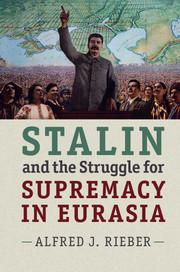Book contents
- Frontmatter
- Dedication
- Contents
- List of maps
- Acknowledgments
- List of abbreviations
- Introduction
- 1 Stalin, man of the borderlands
- 2 Borderlands in Civil War and Intervention
- 3 The borderland thesis: the west
- 4 The borderland thesis: the east
- 5 Stalin in command
- 6 Borderlands on the eve
- 7 Civil wars in the borderlands
- 8 War aims: the outer perimeter
- 9 War aims: the inner perimeter
- 10 Friendly governments: the outer perimeter
- Conclusion: A transient hegemony
- Index
5 - Stalin in command
Published online by Cambridge University Press: 05 September 2015
- Frontmatter
- Dedication
- Contents
- List of maps
- Acknowledgments
- List of abbreviations
- Introduction
- 1 Stalin, man of the borderlands
- 2 Borderlands in Civil War and Intervention
- 3 The borderland thesis: the west
- 4 The borderland thesis: the east
- 5 Stalin in command
- 6 Borderlands on the eve
- 7 Civil wars in the borderlands
- 8 War aims: the outer perimeter
- 9 War aims: the inner perimeter
- 10 Friendly governments: the outer perimeter
- Conclusion: A transient hegemony
- Index
Summary
Despite the war clouds gathering over the borderlands, Stalin long remained uncertain about the best means to oppose them. To be sure, he adhered steadily to his domestic course of building a great socialist power by creating a modern army, intensifying administrative centralization, forging cultural integration through socialist realism and furthering internal colonization through deportation and forced resettlement. Over the same period his consistent aims in foreign policy were to keep external conflict (in Spain and China) as far distant from the Soviet borders as possible and to prevent the Soviet Union from being isolated. By 1941 he had failed in the first aim and narrowly escaped failure in the second.
By leaving open the question of which foreign powers would most fully recognize the interests of the Soviet Union, Stalin permitted two groups within the Soviet ruling elite to advance their own agendas. He could afford to allow this once the opposition had been disgraced or exiled, although he had to exercise care that discussion did not spill over into factionalism. There could be no appearance of a new “opposition.” Both groups adhered to the standard Soviet practice of promoting a division within the capitalist camp in order to prevent a united coalition forming against the USSR. But they differed over the choice of powers with whom to associate and the form of that association.
Two tactics
Litvinov and his supporters in the Foreign Commissariat sought actively to engage the Western liberal democracies in a policy of collective security against fascism under the slogan of the indivisibility of peace. His opponents, V. M. Molotov and A. A. Zhdanov, favored a more passive policy verging on diplomatic autarchy until in 1939 they supported a closer association with Germany and Japan that did not, however, commit the Soviet Union to forming a military alliance with them. Molotov and Zhdanov had the advantage of occupying a much higher standing in the party. Litvinov was not even a member of the Central Committee when he officially presented his program to the government.
- Type
- Chapter
- Information
- Stalin and the Struggle for Supremacy in Eurasia , pp. 152 - 199Publisher: Cambridge University PressPrint publication year: 2015



